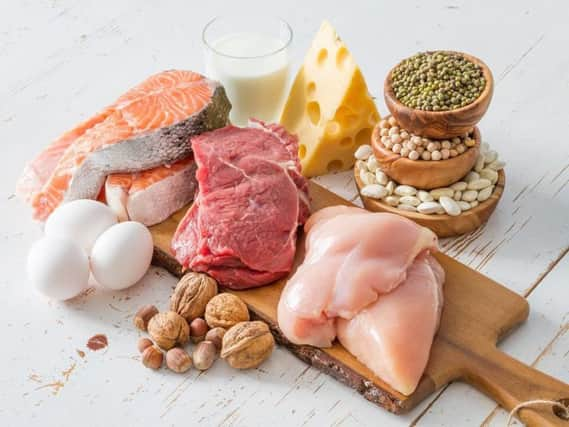Blockchain set to serve up transparency for the Scottish food industry


Blockchain technology may have been invented ten years ago, but it is only much more recently that its application has gone beyond cryptocurrency. Now its potential across all aspects of industry has led to it being declared revolutionary.
The food and drink industry is no different with predictions from all sides that in the coming years, blockchain could significantly change the sector, both in the way it accesses information about products, and in how trustworthy that information can become.
Blockchain technology is essentially a digital database which is shared across a network to build up a number of records of transactional histories.


The important feature is that those details are protected by mathematical algorithms against human error or tampering.
Anyone can look at any modification of the data to see where it has happened and that is replicated across the board and up and down the chain of supply resulting in a very transparent system.
In essence it is a little like a DNA of information, which can potentially follow a product from farm or sea, to plate.
In terms of tracing authenticity and point of origin, the technology has already found a use in gold trading, the mining industry and pharmaceuticals.
In the case of pharmaceuticals, for instance, it can demonstrate quality assurance in the drug supply chain.
It can also be attached to the finished product, which greatly enhances safety and trust in an industry where fraud or tampering can be catastrophic.
But Grant Strachan, a regulatory lawyer in the food and drink sector and associate at law firm Brodies says that isn’t to say that these industries are any further ahead in their adoption of blockchain than food and drink companies.
He says: “A lot of large supermarkets have started to trial the technology.
“In particular, Walmart, Nestlé and another eight companies have recently established Food Trust, a consortium that will utilise blockchain technology within the food supply chain to improve the efficiency of product recall management.
“When there has been some kind of contamination in the food chain, Walmart, who statistically are one of the best supermarkets for dealing with recalls swiftly, initially estimated that it can take over six days for them to find the original contaminated product.
“The advantage of using blockchain is that they can, quite literally, identify the contamination within a matter of seconds, follow the supply chain to the origin and then see where else that product has ended up.”
This not only makes our food safer, but cuts down on food wastage.
In the event of a report of an e coli outbreak, for instance, the current system would see any supermarket involved effectively freeze the supply from all potential suppliers until the source is located.
This has a big cost implication, as well as doing reputational damage.
It is estimated by accountancy firm, PwC, that a large scale outbreak such as this can cost up to 15 per cent of a retailer’s annual company revenues, so an efficient and speedy means to cut this is something that the industry would welcome.
Strachan says: “There is a huge advantage in reducing food waste in pinpointing the exact problem, rather than having to cast a large net around potentially impacted produce, which has to be wasted.”
Food safety is a key concern in the industry which blockchain technology can revolutionise but it has other applications.
As consumers become more interested in the provenance of their food and drink, blockchain offers the opportunity for suppliers to prove claims such as sustainability or specific dietary requirements.
Strachan says: “There have been some interesting case studies recently – the Food Standards Agency (FSA) did a pilot study with an abattoir where they used blockchain to track the meat coming from the facility as a method of collecting and communicating audit results between the FSA and the slaughterhouse.
“A further pilot is in the pipeline and will be extended in scope by granting permission to farmers to access data about animals from their farm.”
Blockchain has found uses in the drinks industry too. Some whisky distilleries are starting to use blockchain in trials to verify the provenance and complex production history of Scotch whisky.
Blockchain can also be used to identify a product’s sustainability. Data captured in this way could record that a tuna fish has not come from overfished waters –information customers are increasingly requesting.
Strachan says: “In addition, companies can track raw ingredients and identify whether they are free from genetic modification or organic, as claimed.”
He believes such information could go much further, in response to customer demand. “There is pressing need for more information on ethics, animal welfare and religious restrictions, as well as sustainability, for our food and this is a way to track such claims.”
There are likely to be some barriers to full use of the technology immediately, Strachan warns.
“One of the perceived drawbacks is in relation to uptake. The current conversation is about large supermarkets investing in the technology, but for it to be really effective you need to have engagement all the way down the supply chain.”
“There is a practical concern as to how you get the actors in the chain on board.”
He says blockchain is not the panacea to eradicate all food fraud in the network, but crucially it can help provide extra security, strength and safeguards.
“If there are wilful actors in the supply chain who are intentionally manipulating entry level data then that is a corrupt link in the chain, so you still need safeguards such as audits on suppliers to make sure the information is robust in the first place.”
At this early stage, a lot of the information and testing of the technology is coming out of the United States, but Strachan believes that the use of blockchain is something that the British food and drink industry needs to engage with.
He says: “The regulations relating to, for example, protected geographical origin or the labelling of food ingredients already exist and blockchain should not disrupt the application of those rules.
“Rather, blockchain is an enabling technology. It has the potential to improve the operational efficiency and effectiveness of the existing regulatory framework. It also has the potential to instantaneously verify the source of origin for foods to empower the consumer to decipher where raw ingredients came from, what ingredients have been used, and how certain foods have been manufactured.
“By doing so, corollary issues related to authenticity and provenance such as sustainability and animal welfare become more transparent.”
In essence, Strachan believes that blockchain offers three benefits, for the industry, regulators and ultimately the consumer.
“The industry can track and trace and know more information about product history to more accurately verify quality, provenance and authenticity.
“Regulators and industry can have a more collaborative relationship where food business operators can use the technology to instantaneously demonstrate regulatory compliance.
“And finally you have a sector that uses technology to verify the safety, authenticity and sustainability of produce ultimately to the benefit of consumers.”
It is because of the commercial advantages that the introduction of blockchain is being driven by the industry with big supermarkets leading the way, but Strachan says the feedback he has heard from regulators is very receptive.
“The FSA in England has pioneered pilot studies and so is very open to its introduction. It will be driven and ultimately financed by industry, but also by increasing consumer demand to know more about the safety, origin and treatment of our food from a trustworthy chain of information.”
Blockchain - a short guide
- Blockchain is a technology which lets people who do not know or may not trust each other to build a dependable ledger of information accessible to all and, in theory, incorruptible.
- It allows encrypted information to be updated on thousands of computers – nodes – around the world simultaneously, akin to a huge shared spreadsheet, and it is accessible to anyone on the internet.
- Its security is guaranteed by a combination of mathematical algorithms and its consensus mechanism, the process by which the nodes agree on how to update the blockchain.
- It allows digital information to be distributed and updated, but not copied.
- The system can be programmed to record not just financial transactions but virtually everything of value.
- The blockchain database isn’t stored in any single location, meaning the records it keeps are public and easily verifiable.
- As no centralised version of the information exists, it would be almost impossible for a hacker to corrupt.
- The technology was invented by Satoshi Nakamoto, the pseudonymous and so far unidentified creator of bitcoin, the cryptocurrency, in 2008.
Applications
By authenticating digital information, blockchain has applications far beyond currency exchanges:
- Supply chain auditing could easily verify ethical claims or the authenticity of products by creating a blockchain-based time-stamping of a date and location that corresponds to a serial number which is attached to the product through the supply chain.
- Direct peer-to-peer payments could cut the need for intermediary companies in the sharing economy, such as Uber, eBay and Airbnb.
- The technology could bring full transparency to elections or any other kind of poll.
- Smart contracts using blockchain can protect copyright and automate the sale of creative works online such as music, eliminating the risk of file copying and unlawful redistribution of intellectual property.
- A number of countries, including Honduras, Greece and Sweden, are undertaking blockchain-based land registry projects.
- Numerous stock and commodities exchanges are prototyping blockchain applications for trading.
For more information, visit brodies.comThis article is taken from The Scotsman's Annual Food & Drink Supplement which can be read in full here.